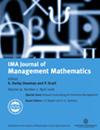温度衍生品估值的随机波动模型
IF 4.3
3区 工程技术
Q3 MANAGEMENT
引用次数: 0
摘要
本文为日平均气温建立了一个新的随机波动模型。它是高斯模型的自然延伸,在该模型中,气温回归到季节性趋势,并具有确定性的随时间变化的波动性。新模型可以在保持可操作性的同时,对极端事件采取更加保守的态度。我们给出了一种基于条件最小二乘法的方法来估算每日数据的参数,并在欧洲八个主要城市估算了我们的模型。然后,我们展示了如何通过蒙特卡洛和傅立叶变换技术有效计算天气衍生品的平均回报。这种新模型可以更好地评估与气温波动有关的风险。本文章由计算机程序翻译,如有差异,请以英文原文为准。
A stochastic volatility model for the valuation of temperature derivatives
This paper develops a new stochastic volatility model for the average daily temperature. It is a natural extension of a Gaussian model in which the temperature returns to a seasonal trend with a deterministic time-dependent volatility. The new model allows to be more conservative regarding extreme events while keeping tractability. We give a method based on Conditional Least Squares to estimate the parameters on daily data and estimate our model on eight major European cities. We then show how to calculate efficiently the average payoff of weather derivatives both by Monte-Carlo and Fourier transform techniques. This new model allows to better assess the risk related to temperature volatility.
求助全文
通过发布文献求助,成功后即可免费获取论文全文。
去求助
来源期刊

IMA Journal of Management Mathematics
OPERATIONS RESEARCH & MANAGEMENT SCIENCE-MATHEMATICS, INTERDISCIPLINARY APPLICATIONS
CiteScore
4.70
自引率
17.60%
发文量
15
审稿时长
>12 weeks
期刊介绍:
The mission of this quarterly journal is to publish mathematical research of the highest quality, impact and relevance that can be directly utilised or have demonstrable potential to be employed by managers in profit, not-for-profit, third party and governmental/public organisations to improve their practices. Thus the research must be quantitative and of the highest quality if it is to be published in the journal. Furthermore, the outcome of the research must be ultimately useful for managers. The journal also publishes novel meta-analyses of the literature, reviews of the "state-of-the art" in a manner that provides new insight, and genuine applications of mathematics to real-world problems in the form of case studies. The journal welcomes papers dealing with topics in Operational Research and Management Science, Operations Management, Decision Sciences, Transportation Science, Marketing Science, Analytics, and Financial and Risk Modelling.
 求助内容:
求助内容: 应助结果提醒方式:
应助结果提醒方式:


